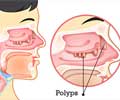
‘Our noses are loaded with bitter taste receptors, but they don't help us taste or smell lunch, instead they help to fight infections.’
Tweet it Now
This new understanding could help pave the way toward new treatments for chronic sinus infections. The clinical name for chronic sinus infections is rhinosinusitis. Previous research at Penn has suggested that a novel way to treat these infections involves manipulating the nasal bitter and sweet taste receptors. Bitter receptors release small proteins called antimicrobial peptides, which kill bacteria, viruses and fungi that enter the nose, while sweet receptors - normally activated by sugar found in mucus - control the rate at which those peptides are released. This new study shows the sweet taste receptor, known as T1R, can also be activated by certain amino acids secreted by bacteria. They took cells from rhinosinusitis patients and isolated the various communities of bacteria that were present. They found cultures of Staphylococcus bacteria produced two D-amino acids called D-Phe and D-Leu, both of which activate T1R sweet receptors and block the release of antimicrobial peptides. "These amino acids, which come from Staphylococcus bacteria, block the body's natural immune response by essentially hitting the breaks on the defensive bitter taste receptors," said the senior study author Noam A. Cohen.
The researchers are developing such a therapy, and a patent on their work is pending. The research appears in the journal Science Signaling.
Source-ANI













